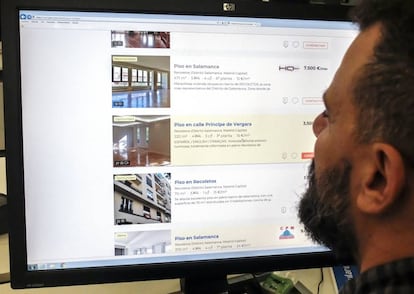Online property scams are getting more sophisticated, experts warn
Authorities in Spain ask would-be buyers and tenants to use common sense when faced with an offer that proposes early payment through uncontrolled channels


“Hi! Thanks for taking the time to look at my property. My name is Ana and I am the owner of the apartment. I am currently working in the UK. If you are interested and want to know more about renting it, get in touch and I will send the step-by-step procedure.”
This is an extract from an email received recently by a property website user who was looking for a place to rent in Madrid. The ad looked interesting, but when she contacted the owner, she got this response. The original message was written in dodgy Spanish and its content raised a few alarm bells. Smelling a rat, the would-be tenant reported it to the police and went on looking.
According to Redondo, cyber-delinquency is climbing by 20% every year
If you think she was being too cautious, think again. As a Civil Guard spokesman points out, the email contains several classic giveaways, one being glaring grammatical errors – Ana used the masculine form of owner (el propietario) as opposed to the feminine (la propietaria). She also said she is in the UK, suggesting that making direct contact with her would be unlikely. But more importantly, the suggested payment procedure was an attempt at circumventing oversight by the website used to make contact.
Otherwise, there was nothing odd about the apartment itself. The price was not especially high, and the apartment was attractive but not disproportionate to the suggested rent.
There is often a surge of fraudulent activity in February as people begin to plan their Easter break
“Obviously, the scammers adapt their modus operandi as they go,” says Captain Alberto Redondo, from the Civil Guard’s cybercrime unit. “What were once clumsy swindles are getting more sophisticated.”
According to Redondo, cyber crime is climbing by 20% every year. While that figure covers all internet fraud, data related to online property scams alone is hard to single out. But what Redondo is clear about is that the scams peak at certain periods of the year, such as the holiday season, as they tend to target short-term rentals.
The online filter
Property websites keep a keen eye out for scammers. Ferran Font, of Pisos.com, says that they detect 10 to 15 fraudulent listings every day and take them down immediately. During peak periods, that number could be as much as 50 a day.
Font says that there is often a surge of fraudulent activity in February as people begin to plan their Easter break. The property websites act as a filter, sifting out the main culprits, though some still manage to get through the net. At Pisos.com, there is a team of six people casting an eye over new ads, with a procedure that includes a phone call to verify that the contact number is correct. “It is rare for anyone to slip through our filters,” says Font, who admits that it is increasingly difficult to spot these types of scam.
Fotocasa is another property website that is aware of the increasing professionalism of the scams, which they say are often run “by international mafias.” According to data gathered by Fotocasa, around 10 dodgy ads are weeded out every day from the 80,000-odd that are posted.
All property websites suggest that common sense is the best preventive measure
Beatriz Toribio, an official at Fotocasa, which is owned by the Norwegian company Schibsted, explains that they have a filter system that automatically deletes listings that don’t comply with a series of conditions. Primarily, there is a code that is sent to the advertiser’s phone. This code should then figure on the ad to guarantee that the number is correct. If it does not, the listing is dropped.
Idealista, which follows a similar protocol, states that their team responds to all complaints by reporting them to the authorities. They also contact the users who have been in contact with fake advertisers.
All these experts suggest that common sense is the best preventive measure of all. They also offer basic advice, such as using secure pages – the ones that start with https and carry the padlock symbol – making sure the applications you are downloading are bona fide, and checking the owner out on Google.
“Often, just by plugging into Google the telephone number or email of the person who is going to rent you the apartment, you will get warnings that it’s a scam,” says Redondo.
It is also worth being wary of anyone who asks for payment in advance, and of properties at suspiciously cheap prices. At the end of the day, says Redondo, “the virtual world is the same as the real world: you have to keep your eyes peeled and know that you won’t get something for nothing.”
English version by Heather Galloway.
Tu suscripción se está usando en otro dispositivo
¿Quieres añadir otro usuario a tu suscripción?
Si continúas leyendo en este dispositivo, no se podrá leer en el otro.
FlechaTu suscripción se está usando en otro dispositivo y solo puedes acceder a EL PAÍS desde un dispositivo a la vez.
Si quieres compartir tu cuenta, cambia tu suscripción a la modalidad Premium, así podrás añadir otro usuario. Cada uno accederá con su propia cuenta de email, lo que os permitirá personalizar vuestra experiencia en EL PAÍS.
¿Tienes una suscripción de empresa? Accede aquí para contratar más cuentas.
En el caso de no saber quién está usando tu cuenta, te recomendamos cambiar tu contraseña aquí.
Si decides continuar compartiendo tu cuenta, este mensaje se mostrará en tu dispositivo y en el de la otra persona que está usando tu cuenta de forma indefinida, afectando a tu experiencia de lectura. Puedes consultar aquí los términos y condiciones de la suscripción digital.








































